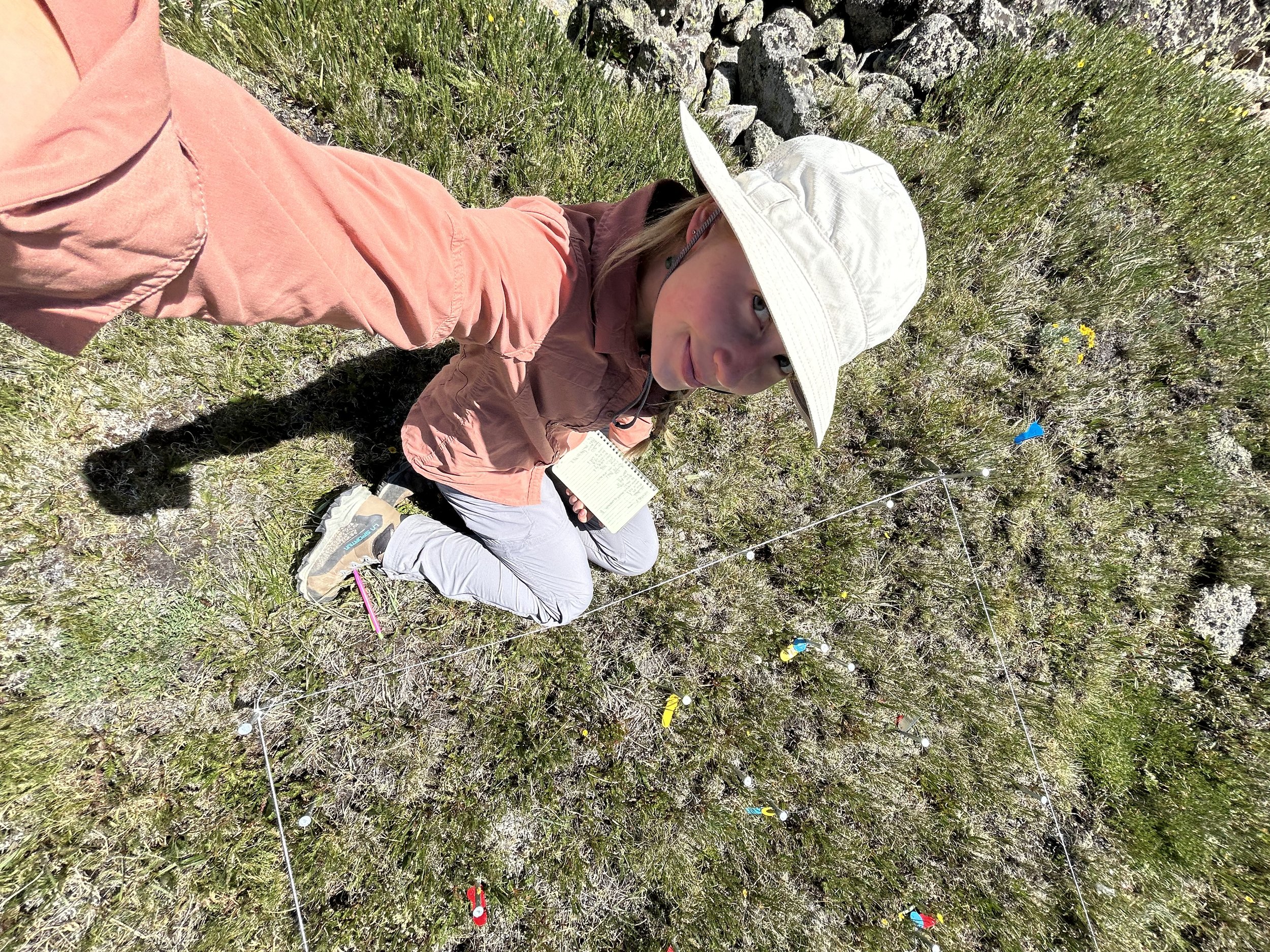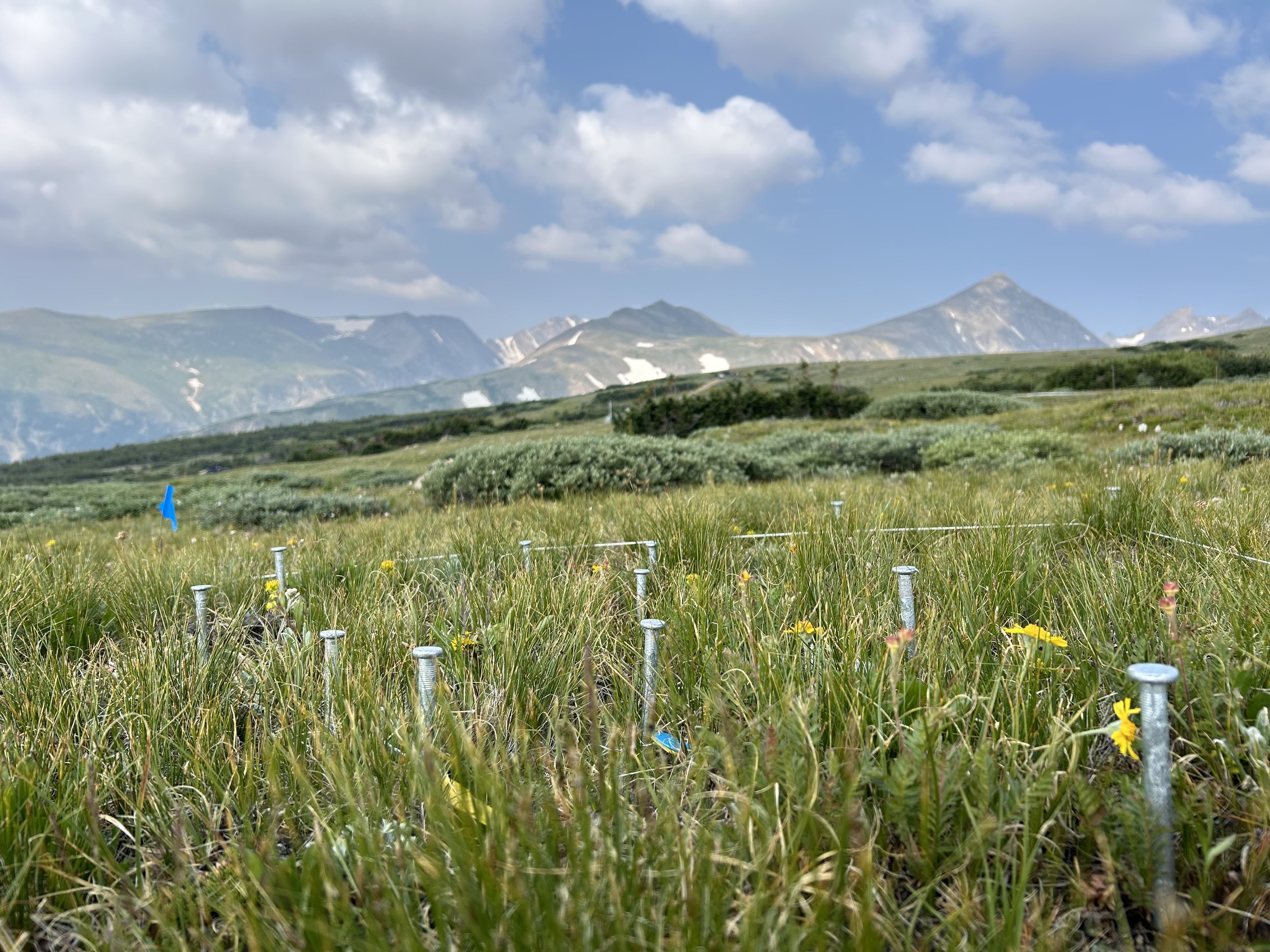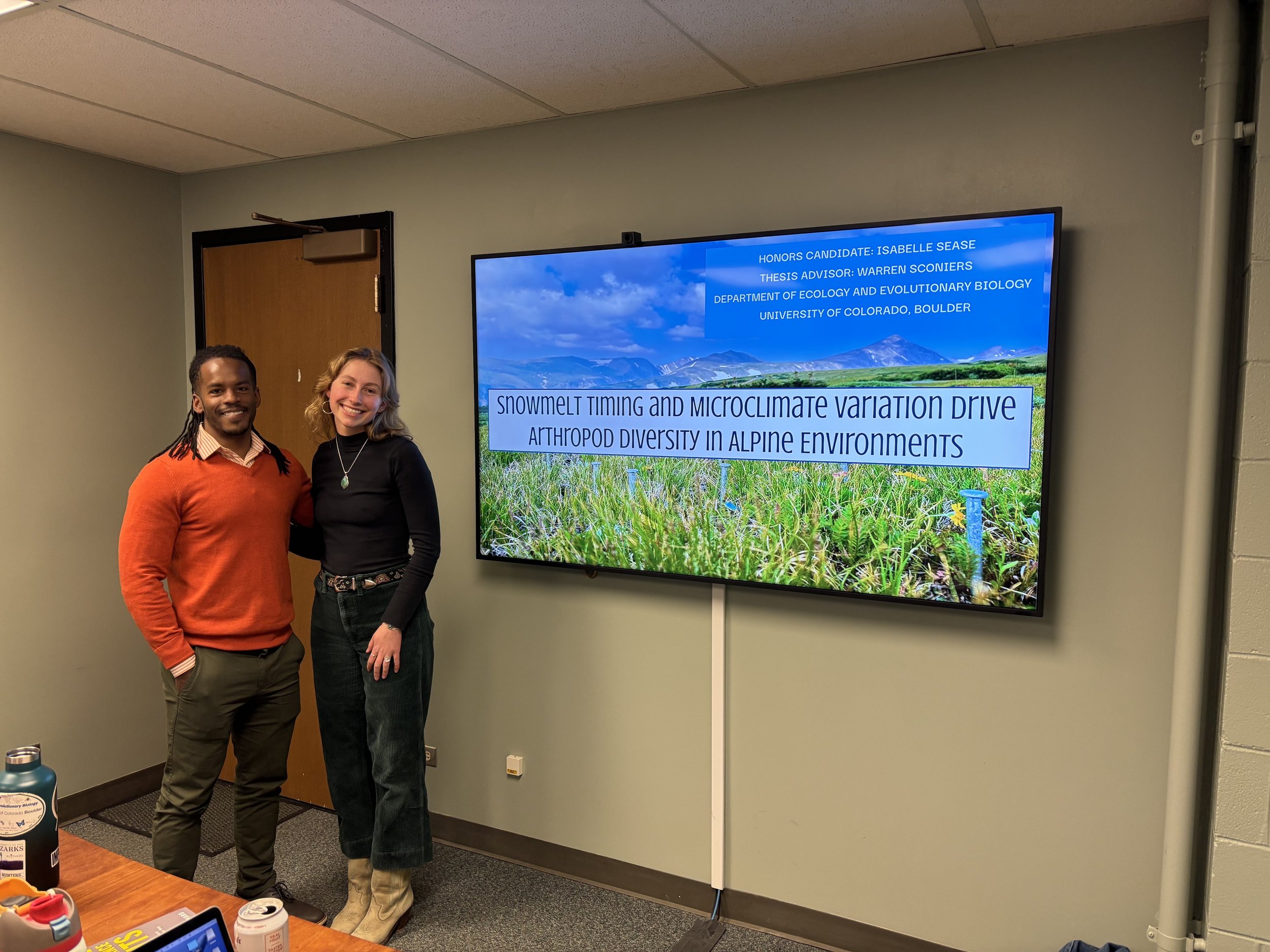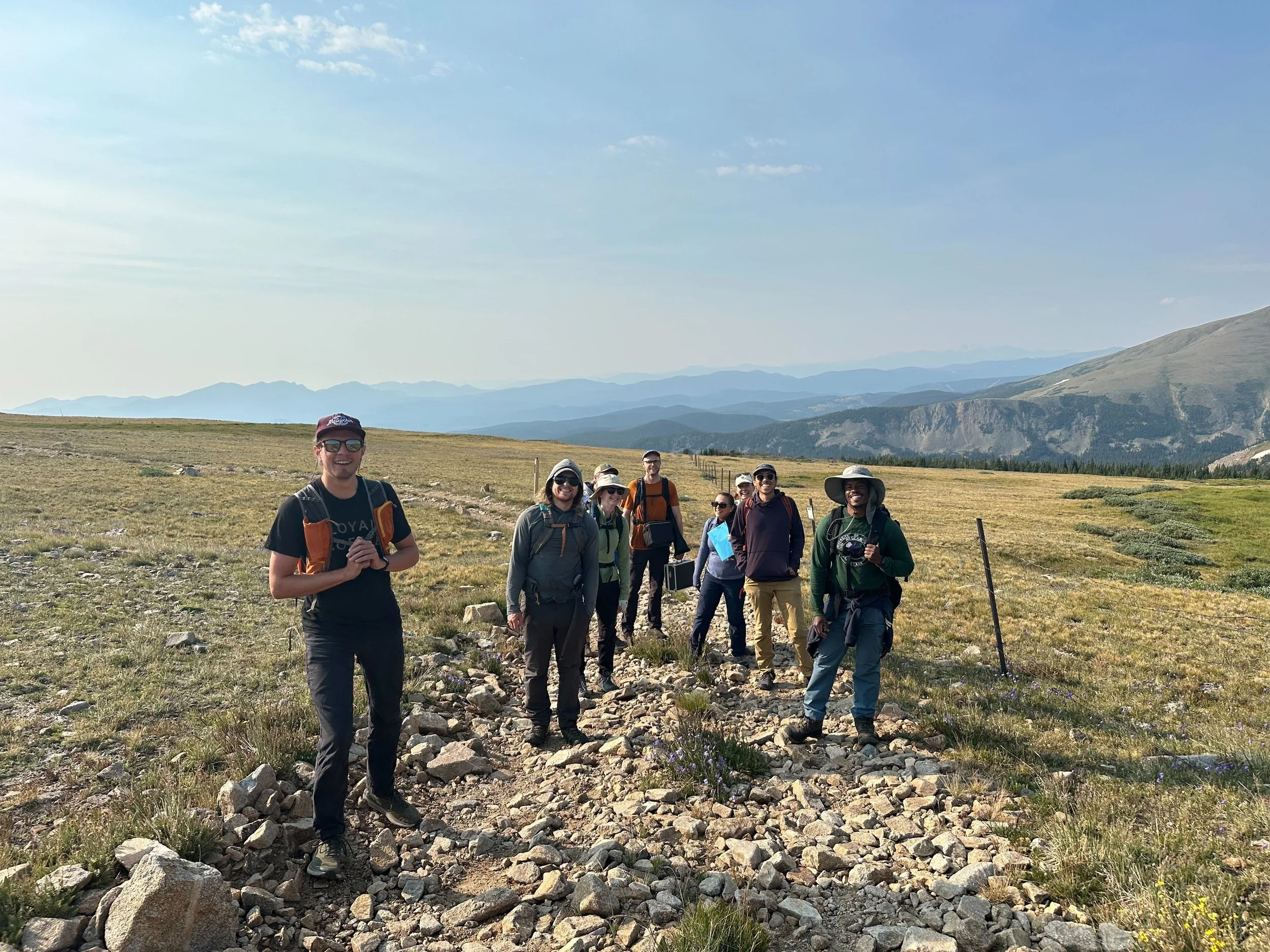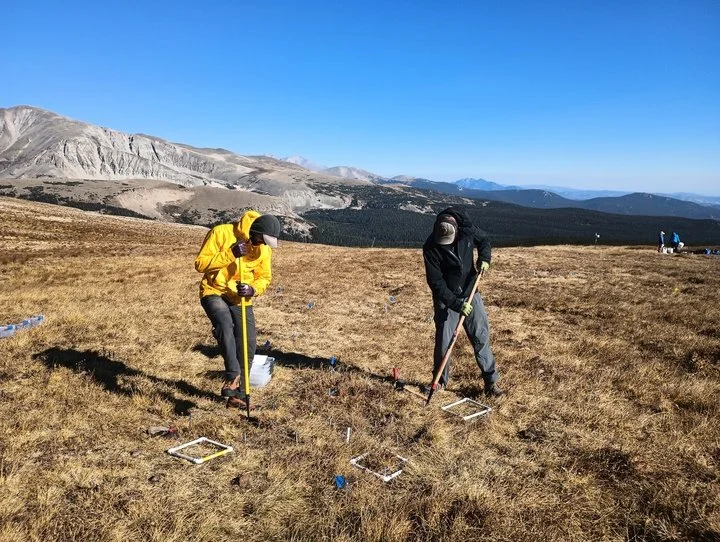CU Boulder undergraduates defend honors theses based on Niwot Ridge Research.
Isabelle Sease (right) with her advisor, Dr. Warren Sconiers. Photo by Nancy Emery.
Van Baronofsky (center) with his advisors Dr. Chris Ray and PhD student Airy Peralta. Photo by Dr. Steve Lamos.
Annalise Schroeder (left) with her advisors Dr. Eve Hinkley and PhD student Jesse Rush. Photo courtesy of Jesse Rush.
Three outstanding undergraduates—Isabelle Sease, Van Baronofsky, and Annalise Schroeder— successfully defended their honors theses in recent presentations at the University of Colorado, Boulder.
The Niwot Ridge LTER congratulates Isabelle (Izzy) Sease, Van Baronofsky, and Annalise (Anna) Schroeder on their presentations and applaud their hard work and dedication to ecological research! Impressed with their work and eager to learn more, we asked Izzy, Van, and Anna some questions about where they come from, what motivates them, and what their research teaches us about ecology on Niwot Ridge:
Izzy Sease
Department of Ecology and Evolutionary Biology, CU Boulder
Izzy enjoying a sunny day of data collection on Niwot Ridge. Photo by Izzy Sease.
Honors Thesis: Influence of Early Snowmelt and Microclimate Variability on Alpine Arthropod Diversity and Community Structure
Tell us about yourself! Where did you grow up, and what got you interested in ecology?
I grew up in Erie, Colorado, about 25 minutes outside of Boulder. I spent my summers exploring the mountains and my winters skiing, developing a love for nature at a young age. I think I always knew, in some form, that I wanted to study ecology—but it wasn’t until a trip to Costa Rica right before college that everything clicked. I remember hiking through the cloud forest, in awe of how the environment changed as we climbed. Our guide talked about the disappearance of species in the region, and it hit me hard. That moment stayed with me, and I ended up switching my major from Integrative Physiology to Ecology and Evolutionary Biology during the first semester of my freshman year.
What inspired you to conduct your honors thesis research with Dr. Warren Sconiers on arthropod communities?
The summer before junior year, I helped a graduate student with fieldwork on montane ants and climate change. I was captivated by the different species and behaviors I saw in the field, and that’s when I really fell in love with insects. When I heard about Dr. Sconiers’ research from a friend, I was instantly hooked—the project combined both my passions and academic interests: bugs, mountains, and climate change. As a rock climber, the alpine has always felt like a second home, and I’ve noticed firsthand how much it’s changed over the years.
Please tell us about your research!
One of Izzy’s research plots on Niwot Ridge. Photo by Izzy Sease.
My project focuses on how alpine arthropod communities respond to early snowmelt and microclimate variation—specifically soil moisture, soil temperature, and plant NDVI (a measure of vegetation density and health). Alpine areas are warming faster than lower elevations, leading to earlier snowmelt and altered plant growth. Using black sand to artificially accelerate snowmelt, arthropods were surveyed at five Niwot Ridge sites over three summers. We found that early snowmelt increased diversity by 20%, with higher NDVI also boosting diversity, and higher soil moisture reducing it. But what really stood out was that responses varied a lot across different taxonomic groups. Herbivores, like Hemiptera and Orthoptera, responded strongly to increased vegetation in the early snowmelt plots. Predators like spiders also increased in abundance overall, but their response didn’t directly track with NDVI the same way herbivores did. That disconnect was especially interesting—it suggests that while early snowmelt and longer growing seasons may benefit some groups, others might not be responding in the same way. These kinds of nonlinear responses could shift important ecological processes like pollination, herbivory, and predator-prey interactions.
Izzy Sease with her advisor, Dr. Warren Sconiers, after successfully defending her honors thesis. Photo by Nancy Emery.
What are the most important things that you learned from your thesis research?
I learned so much during this project—not just about arthropods, community ecology, and microclimates, but also about resilience. My data ended up being a lot messier and more complex than I expected, and I had to teach myself how to code and run mixed models in R. I spent hours troubleshooting, watching tutorials, and pushing through frustration until I finally broke through. That process taught me a lot about persistence, and it’s made me feel much more prepared for the challenges of graduate school.
Van Baronofsky
Department of Ecology and Evolutionary Biology, CU Boulder
Van Baronofsky in his element— pika habitat! Photo by Van Baronofsky.
Honors Thesis: Projecting habitat occupancy and population stage structure in a climate-sensitive species using Markov chain analysis.
Please tell us a little about yourself. Where did you grow up, and what got you interested in ecology?
I grew up in Austin, TX before I came to CU Boulder. I think the main thing that got me more interested in ecology was an environmental studies class that I took during high school. I actually wasn't that outdoorsy when I was younger and didn't have a whole lot of interest in doing something in ecology until I took a gap year between high school and college during 2020 and had some really awesome experiences going camping in Big Bend National Park, New Mexico, and Oklahoma. I also came into school as an Integrative Physiology major on the pre-med track but quickly realized that I wanted to do something in natural sciences because I loved being outside!
What inspired you to conduct your honors thesis research on Pika with Dr. Chris Ray and Airy Peralta?
I actually remember that Chris did a lecture in my Principles of Ecology class, and this was the first time I had even heard of pikas. I went to an EBIO club meeting in 2023 and met Airy and since then my love for pikas has grown so much! That summer, I was a field assistant at Niwot Ridge LTER and helped with survival/occupancy surveys of pikas, so I got to see a ton of them, and it was cool to see how pikas all have unique personalities. From then on I knew I wanted to keep researching pikas.
Please tell us about your research!
Van Baronofsky after successfully defending his honors thesis. He is pictured here with his advisors, Dr. Chris Ray (left) and PhD student Airy Peralta (right). Photo by Dr. Steve Lamos.
My research looks at how climate change may impact pikas in the future. Pikas are highly territorial so it's pretty easy to track whether pikas are in certain territories or not over time. Pikas are also a climate-indicator species because they are sensitive to high temperatures. I wanted to understand whether territory colonization by a pika and mortality of pikas are affected by temperature and snow, because climate change is changing both of these things. I found that in years of higher temperatures and less snow, there was higher mortality of pikas and less colonization of territories by pikas. I also developed a demographic projection model using territory transition rates to better understand how the life stage (whether a pika is a juvenile or an adult) of territory owners and occupancy may be changing in pikas under current conditions (from 2019-2024). My results suggested that occupancy in the population I studied is not trending, but I believe that territory quality may worsen as global warming continues because I found that higher temperatures are worse for pikas. If there are less pikas, this could mean that there will be less prey for predators of pikas (pine martens, weasels, and hawks) and may even lead to the dampening of alpine plant dispersal in some species, because pikas move plants around a lot when they forage. I think that pikas make a great study species because they are not only important to alpine ecosystems, but they are also really cute!
Van spent a lot of time around Pika while researching how climate change may affect them. Check out this video that he took of a pika calling.
What are the most important things that you learned from your thesis research?
I think that I gained a better understanding of alpine ecosystems and their complexity. Alpine ecosystems are so interesting and the effects that pikas have on the environment around them is not very well understood. My research also showed me how little we really know about alpine environments and the effects that climate change will have on species that live in these areas.
Is there anything else you’d like to share?
A pine marten stared at me for half an hour while I was collecting data in the field. They are really curious, cool animals!
Anna Schroeder
Anna Schroeder enjoying a day of soil sampling on Niwot Ridge. Photo by Jesse Rush.
Department of Evolutionary Ecology, University of Colorado Boulder
Honors Thesis: Investigating the Fate of Redox-Active Organic Matter Reduction in High-Elevation Wetlands of the Colorado Rocky Mountains, U.S.
Please tell us a little about yourself. Where did you grow up, and what got you interested in ecology?
I’m from/grew up in Golden, Colorado. I’ve always loved the outdoors and plants. Growing up in Golden provided me with many opportunities to spend time outside and in the mountains. These experiences fostered my curiosity about the natural world and how it works. As I grew older, I became increasingly interested in learning how ecosystems function and addressing environmental challenges like climate change.
What inspired you to conduct your honors thesis research on carbon cycling with Jesse Rush and Dr. Eve Hinckley?
Given my interest in how ecosystems function and in studying ecology and evolutionary biology, I’ve always wanted to pursue scientific research throughout my time here at CU. Last year, I was introduced to Jesse and her work. We clicked right away and last summer I was given the opportunity to work as a research assistant for Eve’s Environmental Biogeochemistry Group. It was a great experience and inspired me to pursue an honors thesis. I found biogeochemistry and carbon cycling interesting and wanted to dive deeper into this.
Please tell us more your research!
Anna Schroeder after successfully defending her honors thesis. She is pictured here with her advisors, Dr. Eve Hinckley (middle) and PhD student Jesse Rush (right). Photo courtesy of Jesse Rush.
High-elevation wetlands are important indicators of environmental shifts caused by global climate change. These wetlands have the potential for disproportionately high biogeochemical cycling on the landscape, but little research has focused on these processes in subalpine or alpine wetlands. My honors thesis research aims to characterize redox-active organic matter reduction, a known key control on carbon cycling in northern wetlands, to better understand the biogeochemistry of these ecosystems and impacts on carbon greenhouse gas production. I investigated the potential for redox-active organic matter reduction, and subsequent methane and carbon dioxide fluxes, at three different wetlands at Niwot Ridge Long-Term Ecological Research Site: a subalpine peatland, a periglacial solifluction lobe, and an alpine wet meadow. Redox-active organic matter reduction occurred, as well as subsequent carbon dioxide and methane production in the subalpine peatland and the periglacial solifluction lobe. These findings demonstrate that redox-active organic matter reduction is an important, overlooked biogeochemical process and an important control on methane production at these sites and adds to our understanding of how high-elevation, wetland ecosystems may respond to climate change.
What are the most important things that you learned from your thesis research?
Field research is be challenging, rewarding, and….FUN! Photo of Anna Schroeder by Jesse Rush.
This honors thesis project has deepened my understanding of redox-active organic matter reduction and its role in the global carbon cycle. I’ve also learned how to “think like a researcher”, developing skills such as knowing how to ask meaningful research questions. Through hands-on field and lab work, I’ve gained invaluable research skills and experiences. This project has been a transformative journey in understanding my identity as a biologist and researcher, confirming my desire to pursue graduate studies in soil and plant science.
Is there anything else you’d like to share?
I had an amazing time working on this project!




